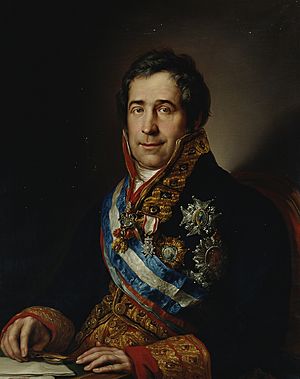Francisco Tadeo Calomarde, 1st Duke of Santa Isabel facts for kids
Quick facts for kids
The Most Excellent
The Duke of Santa Isabel
|
|
|---|---|

Portrait by Vicente López Portaña
|
|
| Prime Minister of Spain | |
| In office 20 January 1832 – 22 February 1832 |
|
| Monarch | Ferdinand VI |
| Preceded by | Manuel González Salmón |
| Succeeded by | Antonio de Saavedra |
| Personal details | |
| Born |
Francisco Tadeo Calomarde y Arría
10 February 1773 Villel, Aragon, Spain |
| Died | 19 June 1842 (aged 69) Toulouse, France |
Francisco Tadeo Calomarde y Arría, 1st Duke of Santa Isabel (born February 10, 1773 – died June 19, 1842) was an important Spanish politician. He served as a minister and had a big impact on Spain's government during a time of many changes.
Contents
Early Life and Education
Francisco Tadeo Calomarde was born in Villel, a town in Aragon, Spain. His family was not wealthy.
He went on to study law in the city of Zaragoza. After finishing his studies, he managed to get a good job in the government's law department. This was a big step for someone from a modest background.
Rising in Politics
Calomarde became known as a strong supporter of the king and traditional ways. He was part of the most conservative groups in the royal court.
In 1808, Spain faced big political changes. Calomarde followed the central government group, called a junta, to Seville and then to Cádiz. When King Ferdinand VII returned to power, Calomarde was quick to support him as an absolute ruler. Because of this, he was given an important role as the first administrator for the Secretaria general de Indias, which handled matters related to the Americas.
Later, due to some issues with his work, he was sent away to Toledo. After secretly returning to Madrid, he was sent away again to Pamplona.
Return to Power
In 1820, Spain's constitution was brought back. Calomarde seemed to join the liberals, who wanted more freedom and a constitution. However, he only gained real power again after the constitution was removed in 1823.
He became a secretary for the government in Madrid. He was seen as someone who would help the reactionaries, who wanted to go back to older, more traditional ways of governing. In 1824, he became the Secretary of Justice.
Minister of Justice
For eight years, Calomarde was very powerful. He handled many important government matters. He had the king's trust, which gave him a lot of freedom to act.
During this time, he worked to limit people's freedoms. He brought back the Jesuits and restored monasteries. He also strongly pursued people who supported liberal ideas.
At the same time, he tried to gain favor with Don Carlos, who was the king's brother. Don Carlos hoped to become king next. However, Calomarde also dealt harshly with any rebellions from Don Carlos's supporters, known as Carlists.
End of His Career
In September 1832, King Ferdinand VII became very ill. People thought he might die. Calomarde was quick to greet Don Carlos as the new king.
When King Ferdinand VII unexpectedly got better, Calomarde tried to convince him to change his will. The king's will said that his daughter, Princess Isabel, would become regent (ruler) of the country. Calomarde wanted the king to bring back the Salic law, which would prevent a woman from ruling and make Don Carlos the heir.
However, on December 31, 1832, the king declared that any changes to his will were not valid. Calomarde was sent away to his lands in Aragon. An order was given for his arrest, but he managed to escape in disguise to France. He died in Toulouse, France, in 1842.
See also
 In Spanish: Francisco Tadeo Calomarde para niños
In Spanish: Francisco Tadeo Calomarde para niños
 | Kyle Baker |
 | Joseph Yoakum |
 | Laura Wheeler Waring |
 | Henry Ossawa Tanner |

